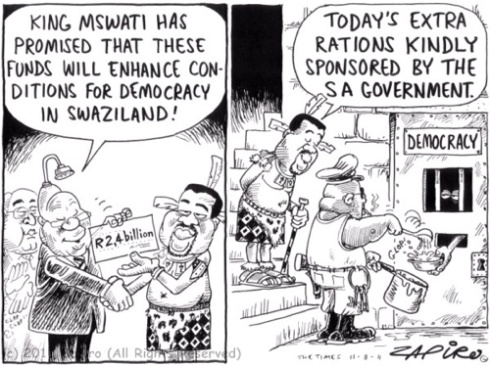 After the reassurance by the South Africa’s High Commissioner to Swaziland, Happy Mahlangu, that South Africa would not force democracy on the country, there was the predictable uproar from sections of Swaziland’s Mass Democratic Movement, which called for the ANC led South African government to recall him.
After the reassurance by the South Africa’s High Commissioner to Swaziland, Happy Mahlangu, that South Africa would not force democracy on the country, there was the predictable uproar from sections of Swaziland’s Mass Democratic Movement, which called for the ANC led South African government to recall him.
As time will tell, nothing of the sort will happen, and it is ironic that this official position on the country came on the tail of a recent pronouncement by the ruling party that it supports the call for democracy in Swaziland.
This forked tongue approach to the situation in Swaziland is not new, and will not change anytime soon by the looks of things. For once the blame should be shifted from the ANC and laid squarely at the feet of Swaziland’s Mass Democratic Movement.
Swaziland’s mass democratic Movement does not have a dynamic, practical nor coherent International Relations strategy. Its international relations can best be described as sycophantic, narrow and static.
Despite its relatively rich political strata, Swaziland’s Mass Democratic Movement has limited its engagement with South African society to the ruling tripartite alliance, thus limiting its own ability to take advantage of numerous contradictions within South Africa’s political parties.
The most obvious and yet alarming example is the manner in which the official opposition party, the Democratic Alliance, is treated like a pariah despite the leading role it took In opposing the ZANU PF government in Zimbabwe.
While Swazi political parties who hobnob with the ANC and who sometimes act as wings of the South African ruling tripartite alliance in Swaziland might find it difficult to seek allies outside the tripartite alliance, this does not apply to Swaziland’s other political parties, civic organizations and other popular movements.
Moreover, South Africa’s opposition is so varied that all of Swaziland’s political parties can find suitable matches amongst it. It boggles the mind, for example, how Swaziland’s oldest political party, the NNLC, a party with Pan African leanings, has not officially engaged the Pan African parties in South Africa on issues of solidarity.
The Inkatha Freedom Party (IFP) should have long standing relationship with parties such as SWADEPA and Sive Siyinqaba, who share views on tribal influenced politics.
Most importantly, however, solidarity knows no ideological boundaries. The issue is democracy and that is something shared by all the parties on either side of the fence. South Africa is not the one party state it is rumoured to be. As long as South Africa’s parliament contains the multitude of political parties, they too have a significant role to play in shaping their country’s foreign policy.
It is time for Swaziland’s Mass Democratic Movement to evolve from streets level and begin to engage the entire South African political spectrum on the role that South African can play, as the biggest trade partner and biggest physical neighbour to South Africa. Democracy knows no boundaries, be they physical, racial or ideological.
